人教版英语八年级下册Unit 9 Have you ever been to a museum? Section A(3a-4c) PPT课件(共57张PPT)
文档属性
| 名称 | 人教版英语八年级下册Unit 9 Have you ever been to a museum? Section A(3a-4c) PPT课件(共57张PPT) | 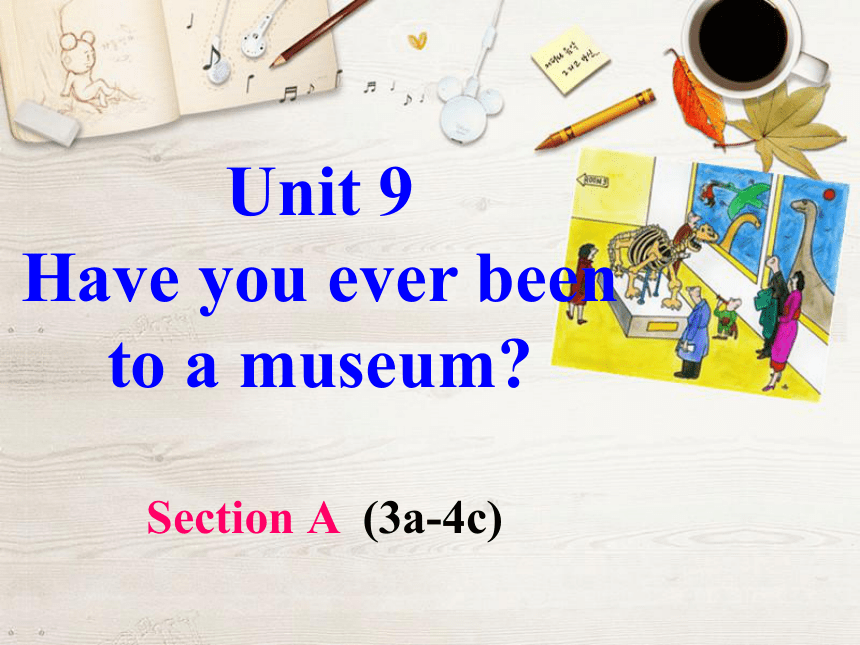 | |
| 格式 | zip | ||
| 文件大小 | 3.3MB | ||
| 资源类型 | 教案 | ||
| 版本资源 | 人教新目标(Go for it)版 | ||
| 科目 | 英语 | ||
| 更新时间 | 2020-06-15 20:05:02 | ||
图片预览

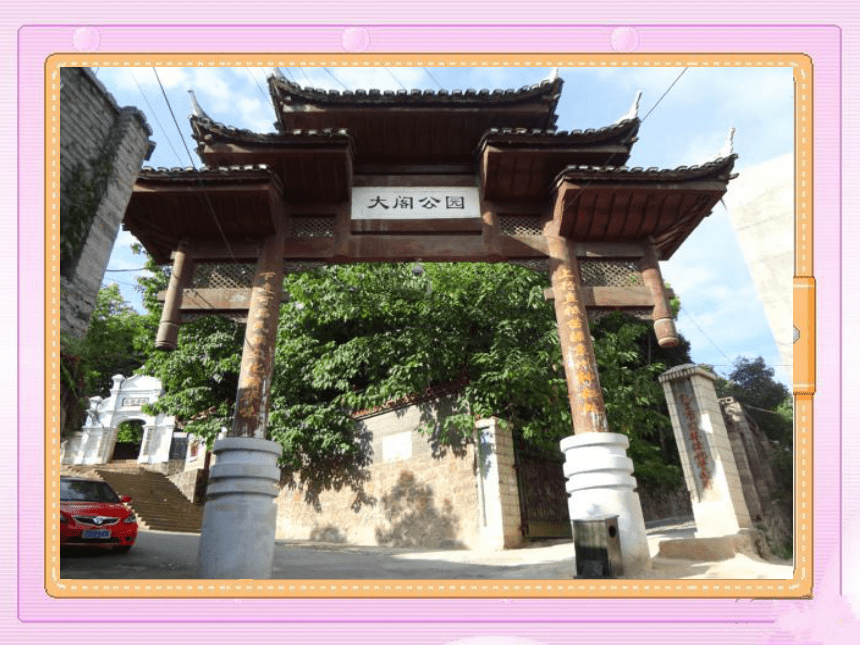
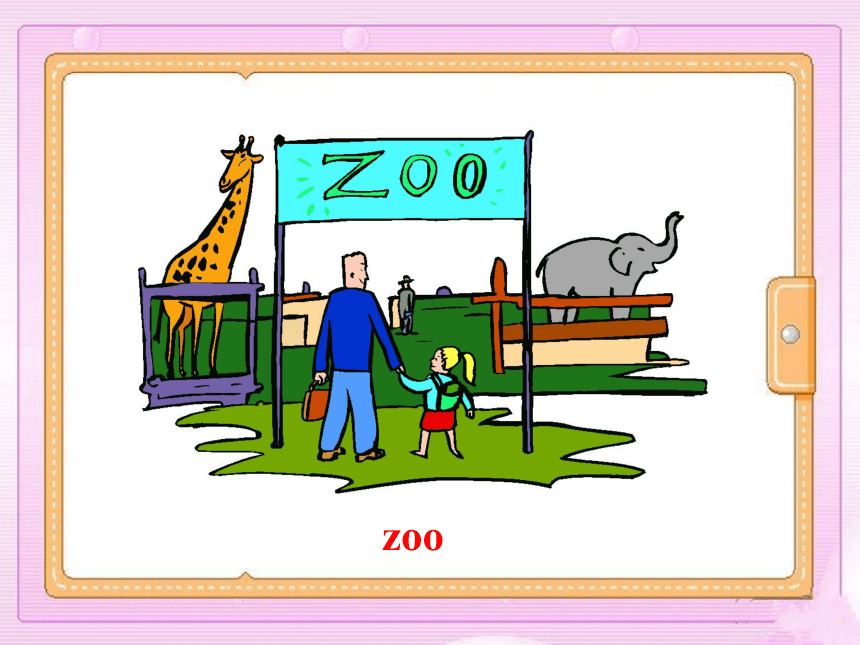
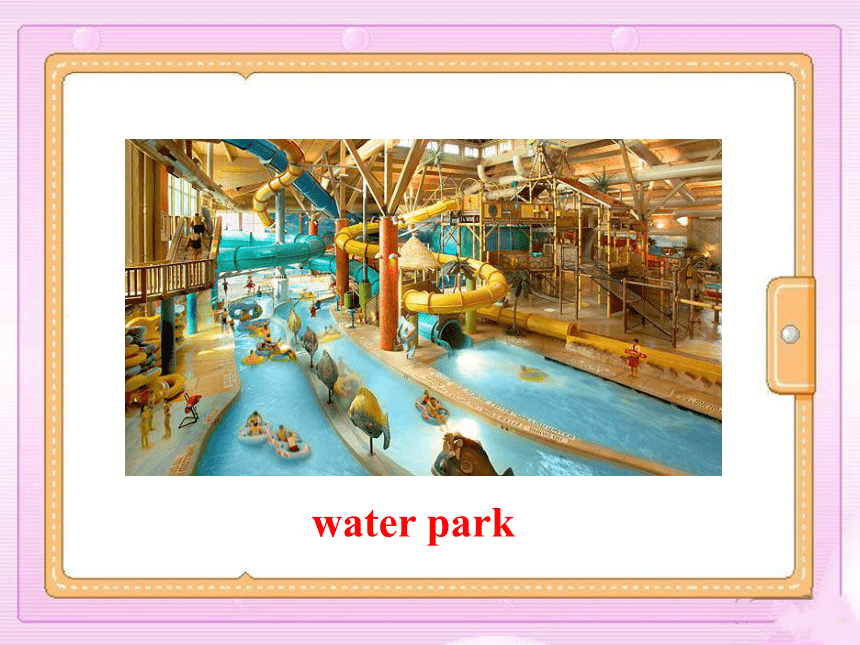
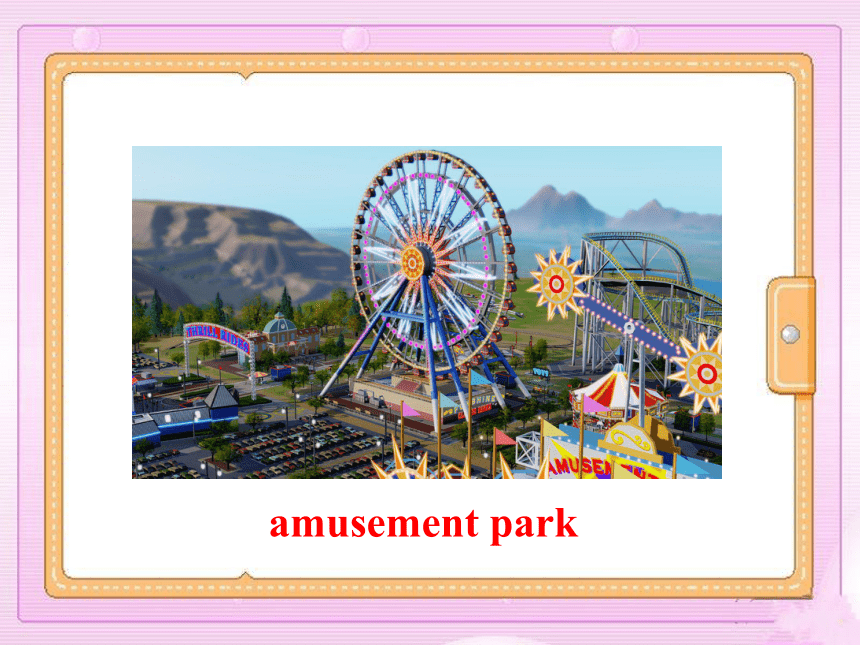
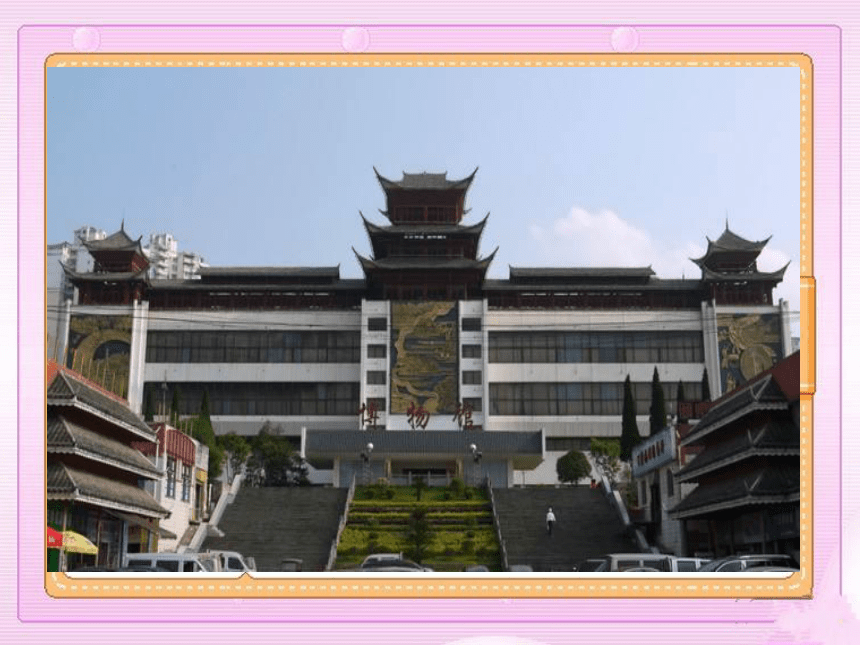
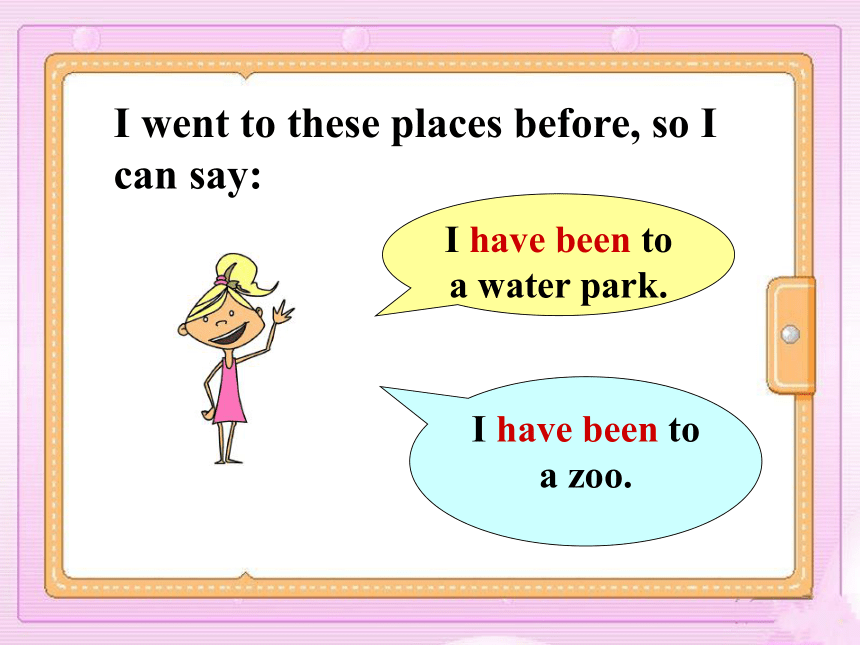
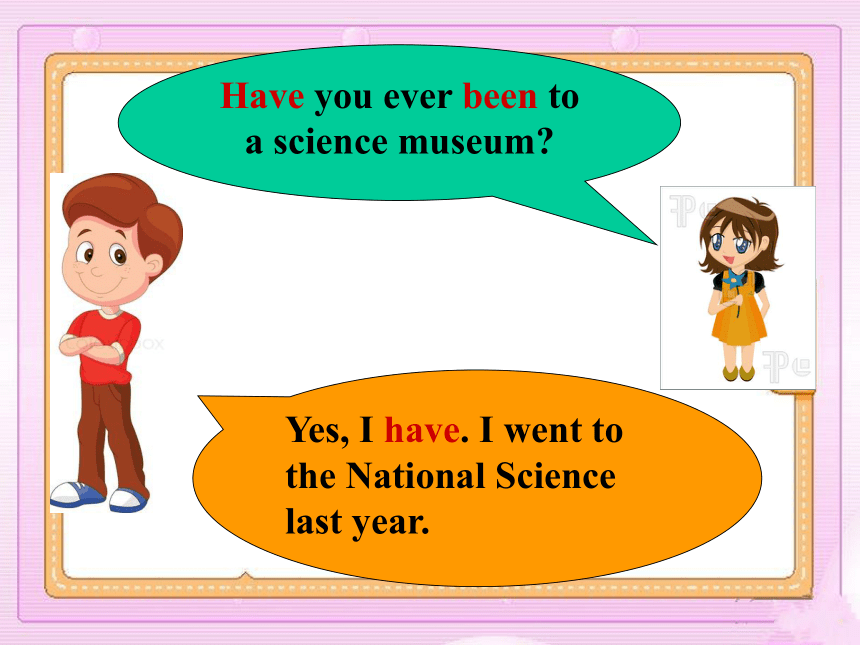
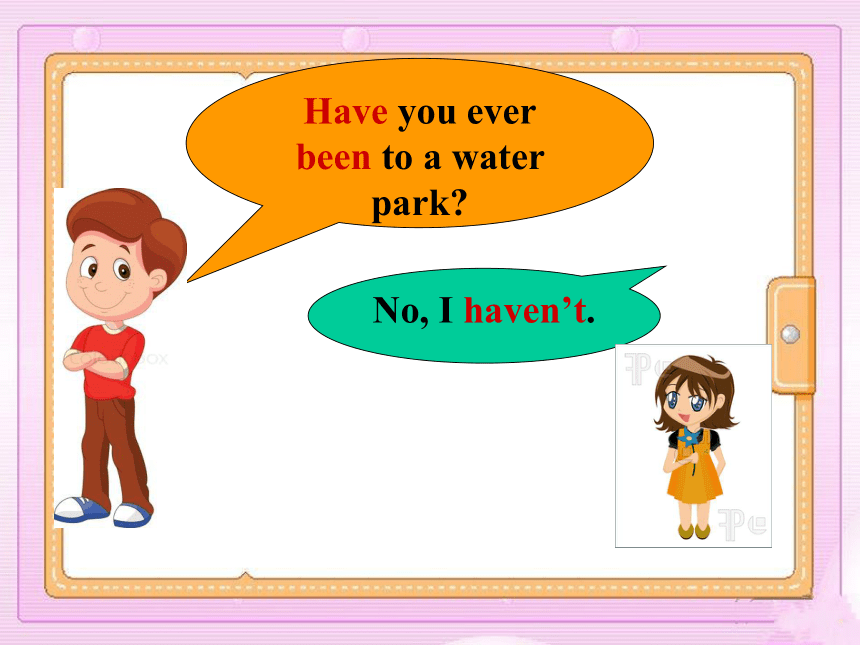
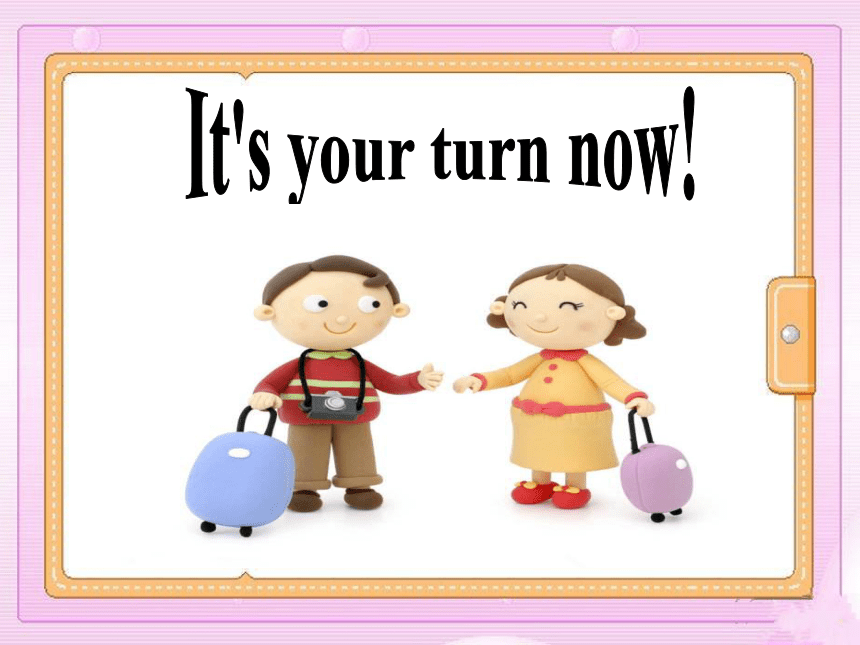
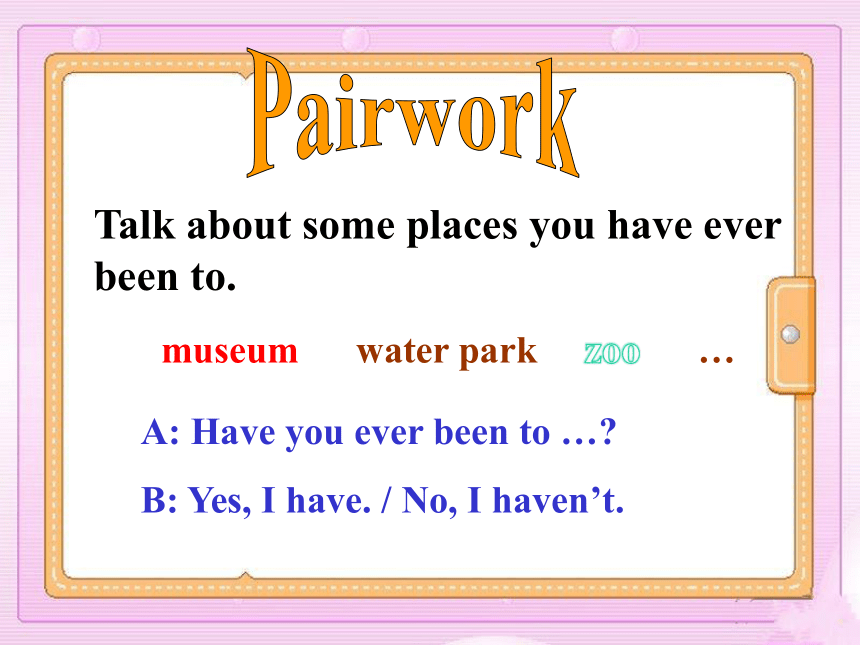
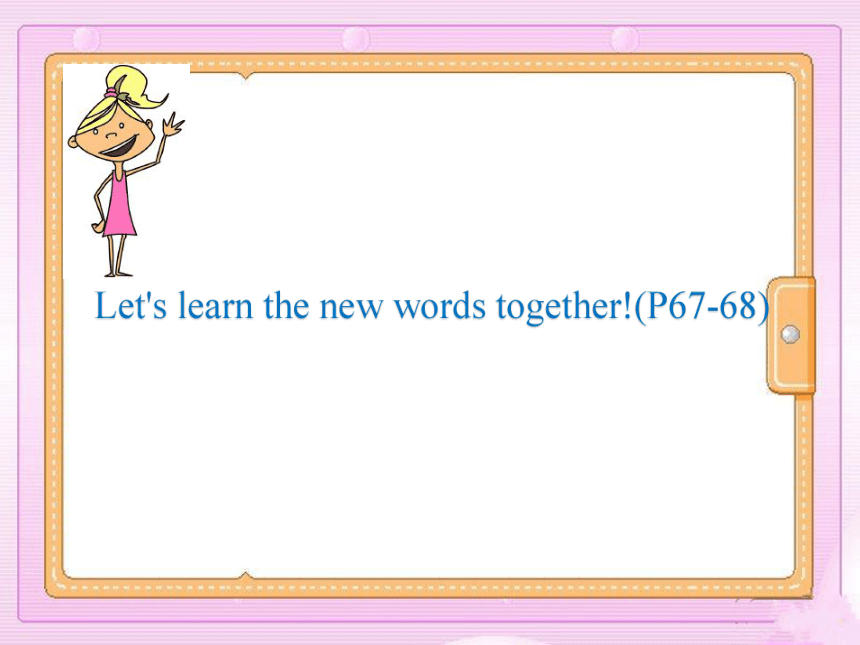
文档简介
(共57张PPT)
Unit
9
Have
you
ever
been
to
a
museum?
Section
A
(3a-4c)
zoo
water
park
amusement
park
I
went
to
these
places
before,
so
I
can
say:
I
have
been
to
a
water
park.
I
have
been
to
a
zoo.
Have
you
ever
been
to
a
science
museum?
Yes,
I
have.
I
went
to
the
National
Science
last
year.
No,
I
haven’t.
Have
you
ever
been
to
a
water
park?
It's
your
turn
now!
A:
Have
you
ever
been
to
…?
B:
Yes,
I
have.
/
No,
I
haven’t.
Talk
about
some
places
you
have
ever
been
to.
museum
water
park
zoo
…
Pairwork
Let's
learn
the
new
words
together!(P67-68)
3a.
Three
students
talk
about
the
most
interesting
museums
they
have
ever
been
to.
Read
the
magazine
article
and
answer
the
questions.
1.
Which
three
museums
do
the
students
talk
about?
2.
What
do
you
think
is
the
most
interesting
thing
about
each
museum?
Ken:
The
most
interesting
museum
I’ve
ever
been
to
is
the
American
Computer
Museum.
They
have
information
about
different
computers
and
who
invented
them.
The
old
computers
were
much
bigger.
It’s
unbelievable
that
technology
has
progressed
in
such
a
rapid
way!
I’ve
also
learned
that
there
was
a
special
computer.
It
could
play
chess
even
better
than
humans.
I
wonder
how
much
more
computers
will
be
able
to
do
in
the
future.
Amy:
I’ve
recently
been
to
a
very
unusual
museum
in
India,
the
International
Museum
of
Toilets.
I
just
couldn’t
believe
my
eyes
when
I
saw
so
many
different
kinds
of
toilets
there.
The
museum
teaches
people
about
the
history
and
development
of
toilets.
It
also
encourages
governments
and
social
groups
to
think
about
ways
to
improve
toilets
in
the
future.
The
International
Museum
of
Toilets.
国际马桶博物馆
这是位于印度新德里的一个主题式展览馆,收藏、陈列的马桶装置十分丰富,从古至今,应有尽有,简直就是一部厕所的发展史。参观者可从不同角度去认识厕所的演变
史。同时,博物馆里还收藏了许多名人用过的厕所及相关物品的复制品,旨在开拓人们
视野,进行社会文明教育,推广环保宣传和研究。
Linlin:
Last
year
I
went
to
the
Hangzhou
National
Tea
Museum.
It’s
a
relaxing
and
peaceful
place
near
a
lake.
The
tea
art
performances
show
how
to
make
a
perfect
cup
of
tea
with
beautiful
tea
sets.
Watching
the
tea
preparation
is
just
as
enjoyable
as
drinking
the
tea
itself.
I’ve
finally
realized
why
my
grandpa
loves
drinking
tea
and
collecting
tea
sets.
Watching
the
tea
preparation
is
just
as
enjoyable
as
drinking
the
tea
itself.
看沏茶的过程和饮茶本身一样令人愉快。
-able是一个典型的形容词后缀,可加在动词之后,表示“可……的;能够……的”;
此处enjoyable(能使人快乐的;令人愉快的)便是一例,再如:drinkable(可饮用的),
washable
(可洗的),readable
(可读的),usable
(可用的;可使用的)等等。
1.
Which
three
museums
do
the
students
talk
about?
2.
What
do
you
think
is
the
most
interesting
thing
about
each
museum?
The
American
Computer
Museum;
The
International
Museum
of
Toilets;
The
Hangzhou
National
Tea
Museum.
The
American
Computer
Museum
—the
special
computer
that
can
play
chess
even
better
than
humans.
1.
What
does
Ken
say
about
the
American
Computer
Museum?
3b.
Read
the
article
again
and
answer
the
following
questions.
The
American
Computer
Museum
is
the
most
interesting
one.
They
have
information
about
different
computers
and
who
invented
them.
The
old
computers
were
much
bigger.
It
could
play
chess
even
better
than
humans.
2.
What
can
we
learn
at
the
International
Museum
of
Toilets?
The
museum
teaches
people
about
the
history
and
development
of
toilets.
It
also
encourages
governments
and
social
groups
to
think
about
ways
to
improve
toilets
in
the
future.
3.
Why
is
the
Hangzhou
National
Tea
Museum
a
nice
place
to
enjoy
tea?
It’s
a
relaxing
and
peaceful
place
near
a
lake.
The
tea
art
performances
show
how
to
make
a
perfect
cup
of
tea
with
beautiful
tea
sets.
Watching
the
tea
preparation
is
just
as
enjoyable
as
drinking
the
tea
itself.
3c.
Which
of
the
underlined
words
in
the
passage
have
the
following
meanings?
make
(something)
better
become
better
uncommon
quiet
made
quick
improve
progressed
unusual
peaceful
invented
rapid
Discussion
Which
of
these
museums
would
you
like
to
visit?
space
museum
history
museum
art
museum
______museum
你曾经去过科学博物馆吗?
Have
you
ever
been
to
a
science
museum?
是的,我去过科学博物馆。/不,我从未去过科学博物馆。
Yes,
I’ve
been
to
a
science
museum./
No,
I’ve
never
been
to
a
science
museum.
你曾经参观过太空博物馆吗?
Have
you
ever
visited
the
space
museum?
是的,我参观过,我去年去过。/不,我从未参观过。
Yes,
I
have.
I
went
there
last
year./
No,
I
haven’t.
我曾经去过艺术博物馆许多次。
I’ve
been
to
the
art
museum
many
times.
我也是。我还参观过自然博物馆。
Me,
too.
And
I’ve
also
visited
the
nature
museum.
我从没去过水上公园。
I’ve
never
been
to
a
water
park.
我也没去过。
Me
neither.
Have
you
had
your
lunch
yet?
Yes,
I
have.
I
have
just
had
it.
(现在我不饿了)
表示过去发生或已经完成的动作对现在造成的影响或结果。
现在完成时的用法
肯定式
否定式
I/You/We/They
have
finished
the
work.
He/She/It
has
finished
the
work.
I/You/We/They
have
not
finished
the
work.
He/She/It
has
not
finished
the
work.
构成:have(助动词)
+
p.p
has(第三人称单数助动词)
+
p.p
Present
Perfect
Tense
现在完成时
I
have
already
taught
him
some
English.
John
has
never
been
to
the
space
museum.
My
boy
has
just
started
junior
high
school.
现在完成时常与时间副词already,
never,
ever,
just,
before,
yet等连用。
比较:I
have
seen
the
film.
我看过这部电影。
(我了解这部电影的内容)
I
saw
the
film
last
month.
我上个月看了这部电影。
(只说明上星期看了这部电影,不
涉及现在的情况)
一般过去时与现在完成时的区别
①
一般过去时只强调过去的动作;现在完成时强调过去的事情对现在的影响。
②
一般过去时通常与表示过去的时间状语连用;现在完成时则不能与表示过去的时间状语连用。
③
一般过去时单纯表示过去的经历;现在完成时表示过去的动作或状态延续到现在并可能持续下去。
4a
Put
the
correct
forms
of
the
verbs
in
the
blanks.
1.
A:
Do
you
want
________
(come)
to
the
space
museum?
B:
No,
I’ve
already
______
(be)
there
three
times.
2.
A:
Have
you
_____
(see)
the
robots
at
the
science
museum?
B:
Yes,
I
_____
(go)
there
last
weekend.
to
come
been
seen
went
3.
A:
Let’s
_______
(spend)
the
day
at
the
zoo.
B:
Well,
I’ve
already
______
(be)
there
a
couple
of
times,
but
I’m
happy
_______
(go)
again.
4.
A:
How
about
______
(go)
to
the
art
museum?
There
are
some
special
German
paintings
there
right
now.
B:
Sure.
When
do
you
want
_____
(go)?
spend
been
to
go
going
to
go
5.
A:
Have
you
ever
_______
(visit)
the
history
museum?
B:
No,
I’ve
never
______
(be)
there.
visited
been
Exercises
中考链接
[中考题]They
______
England
and
they
will
be
back
next
week.
A.
have
gone
to
B.
have
been
to
C.
have
gone
in
D.
has
been
on
比较:He
has
been
to
Beijing.
他曾去过北京。
(人已回来,可能在这儿)
He
has
gone
to
Beijing.
他已经去北京了。
(人已走,不在这儿)
have
been
to
&
have
gone
to
区别
have
/
has
been
(to)
表示“曾经到过某地”,说话时此人不在那里,已经回来。侧重指经历。
have
/
has
gone
(to)
表示某人“已经去某地了”,说话时此人可能在路上或已到那里,反正不在这里。
[中考题]They
______
England
and
they
will
be
back
next
week.
A.
have
gone
to
B.
have
been
to
C.
have
gone
in
D.
has
been
on
【点拨】选A。句意:他们去了英国将在下周回来。have
gone
to去了某地,表示说话时此人不在现场;have
been
to去过某地,表示说话时此人已回到说话的地方。故选A项。
1.Fill
in
the
blanks
in
4b.
2.Do
the
other
exercises
in
this
part.
Unit
9
Have
you
ever
been
to
a
museum?
Section
A
(3a-4c)
zoo
water
park
amusement
park
I
went
to
these
places
before,
so
I
can
say:
I
have
been
to
a
water
park.
I
have
been
to
a
zoo.
Have
you
ever
been
to
a
science
museum?
Yes,
I
have.
I
went
to
the
National
Science
last
year.
No,
I
haven’t.
Have
you
ever
been
to
a
water
park?
It's
your
turn
now!
A:
Have
you
ever
been
to
…?
B:
Yes,
I
have.
/
No,
I
haven’t.
Talk
about
some
places
you
have
ever
been
to.
museum
water
park
zoo
…
Pairwork
Let's
learn
the
new
words
together!(P67-68)
3a.
Three
students
talk
about
the
most
interesting
museums
they
have
ever
been
to.
Read
the
magazine
article
and
answer
the
questions.
1.
Which
three
museums
do
the
students
talk
about?
2.
What
do
you
think
is
the
most
interesting
thing
about
each
museum?
Ken:
The
most
interesting
museum
I’ve
ever
been
to
is
the
American
Computer
Museum.
They
have
information
about
different
computers
and
who
invented
them.
The
old
computers
were
much
bigger.
It’s
unbelievable
that
technology
has
progressed
in
such
a
rapid
way!
I’ve
also
learned
that
there
was
a
special
computer.
It
could
play
chess
even
better
than
humans.
I
wonder
how
much
more
computers
will
be
able
to
do
in
the
future.
Amy:
I’ve
recently
been
to
a
very
unusual
museum
in
India,
the
International
Museum
of
Toilets.
I
just
couldn’t
believe
my
eyes
when
I
saw
so
many
different
kinds
of
toilets
there.
The
museum
teaches
people
about
the
history
and
development
of
toilets.
It
also
encourages
governments
and
social
groups
to
think
about
ways
to
improve
toilets
in
the
future.
The
International
Museum
of
Toilets.
国际马桶博物馆
这是位于印度新德里的一个主题式展览馆,收藏、陈列的马桶装置十分丰富,从古至今,应有尽有,简直就是一部厕所的发展史。参观者可从不同角度去认识厕所的演变
史。同时,博物馆里还收藏了许多名人用过的厕所及相关物品的复制品,旨在开拓人们
视野,进行社会文明教育,推广环保宣传和研究。
Linlin:
Last
year
I
went
to
the
Hangzhou
National
Tea
Museum.
It’s
a
relaxing
and
peaceful
place
near
a
lake.
The
tea
art
performances
show
how
to
make
a
perfect
cup
of
tea
with
beautiful
tea
sets.
Watching
the
tea
preparation
is
just
as
enjoyable
as
drinking
the
tea
itself.
I’ve
finally
realized
why
my
grandpa
loves
drinking
tea
and
collecting
tea
sets.
Watching
the
tea
preparation
is
just
as
enjoyable
as
drinking
the
tea
itself.
看沏茶的过程和饮茶本身一样令人愉快。
-able是一个典型的形容词后缀,可加在动词之后,表示“可……的;能够……的”;
此处enjoyable(能使人快乐的;令人愉快的)便是一例,再如:drinkable(可饮用的),
washable
(可洗的),readable
(可读的),usable
(可用的;可使用的)等等。
1.
Which
three
museums
do
the
students
talk
about?
2.
What
do
you
think
is
the
most
interesting
thing
about
each
museum?
The
American
Computer
Museum;
The
International
Museum
of
Toilets;
The
Hangzhou
National
Tea
Museum.
The
American
Computer
Museum
—the
special
computer
that
can
play
chess
even
better
than
humans.
1.
What
does
Ken
say
about
the
American
Computer
Museum?
3b.
Read
the
article
again
and
answer
the
following
questions.
The
American
Computer
Museum
is
the
most
interesting
one.
They
have
information
about
different
computers
and
who
invented
them.
The
old
computers
were
much
bigger.
It
could
play
chess
even
better
than
humans.
2.
What
can
we
learn
at
the
International
Museum
of
Toilets?
The
museum
teaches
people
about
the
history
and
development
of
toilets.
It
also
encourages
governments
and
social
groups
to
think
about
ways
to
improve
toilets
in
the
future.
3.
Why
is
the
Hangzhou
National
Tea
Museum
a
nice
place
to
enjoy
tea?
It’s
a
relaxing
and
peaceful
place
near
a
lake.
The
tea
art
performances
show
how
to
make
a
perfect
cup
of
tea
with
beautiful
tea
sets.
Watching
the
tea
preparation
is
just
as
enjoyable
as
drinking
the
tea
itself.
3c.
Which
of
the
underlined
words
in
the
passage
have
the
following
meanings?
make
(something)
better
become
better
uncommon
quiet
made
quick
improve
progressed
unusual
peaceful
invented
rapid
Discussion
Which
of
these
museums
would
you
like
to
visit?
space
museum
history
museum
art
museum
______museum
你曾经去过科学博物馆吗?
Have
you
ever
been
to
a
science
museum?
是的,我去过科学博物馆。/不,我从未去过科学博物馆。
Yes,
I’ve
been
to
a
science
museum./
No,
I’ve
never
been
to
a
science
museum.
你曾经参观过太空博物馆吗?
Have
you
ever
visited
the
space
museum?
是的,我参观过,我去年去过。/不,我从未参观过。
Yes,
I
have.
I
went
there
last
year./
No,
I
haven’t.
我曾经去过艺术博物馆许多次。
I’ve
been
to
the
art
museum
many
times.
我也是。我还参观过自然博物馆。
Me,
too.
And
I’ve
also
visited
the
nature
museum.
我从没去过水上公园。
I’ve
never
been
to
a
water
park.
我也没去过。
Me
neither.
Have
you
had
your
lunch
yet?
Yes,
I
have.
I
have
just
had
it.
(现在我不饿了)
表示过去发生或已经完成的动作对现在造成的影响或结果。
现在完成时的用法
肯定式
否定式
I/You/We/They
have
finished
the
work.
He/She/It
has
finished
the
work.
I/You/We/They
have
not
finished
the
work.
He/She/It
has
not
finished
the
work.
构成:have(助动词)
+
p.p
has(第三人称单数助动词)
+
p.p
Present
Perfect
Tense
现在完成时
I
have
already
taught
him
some
English.
John
has
never
been
to
the
space
museum.
My
boy
has
just
started
junior
high
school.
现在完成时常与时间副词already,
never,
ever,
just,
before,
yet等连用。
比较:I
have
seen
the
film.
我看过这部电影。
(我了解这部电影的内容)
I
saw
the
film
last
month.
我上个月看了这部电影。
(只说明上星期看了这部电影,不
涉及现在的情况)
一般过去时与现在完成时的区别
①
一般过去时只强调过去的动作;现在完成时强调过去的事情对现在的影响。
②
一般过去时通常与表示过去的时间状语连用;现在完成时则不能与表示过去的时间状语连用。
③
一般过去时单纯表示过去的经历;现在完成时表示过去的动作或状态延续到现在并可能持续下去。
4a
Put
the
correct
forms
of
the
verbs
in
the
blanks.
1.
A:
Do
you
want
________
(come)
to
the
space
museum?
B:
No,
I’ve
already
______
(be)
there
three
times.
2.
A:
Have
you
_____
(see)
the
robots
at
the
science
museum?
B:
Yes,
I
_____
(go)
there
last
weekend.
to
come
been
seen
went
3.
A:
Let’s
_______
(spend)
the
day
at
the
zoo.
B:
Well,
I’ve
already
______
(be)
there
a
couple
of
times,
but
I’m
happy
_______
(go)
again.
4.
A:
How
about
______
(go)
to
the
art
museum?
There
are
some
special
German
paintings
there
right
now.
B:
Sure.
When
do
you
want
_____
(go)?
spend
been
to
go
going
to
go
5.
A:
Have
you
ever
_______
(visit)
the
history
museum?
B:
No,
I’ve
never
______
(be)
there.
visited
been
Exercises
中考链接
[中考题]They
______
England
and
they
will
be
back
next
week.
A.
have
gone
to
B.
have
been
to
C.
have
gone
in
D.
has
been
on
比较:He
has
been
to
Beijing.
他曾去过北京。
(人已回来,可能在这儿)
He
has
gone
to
Beijing.
他已经去北京了。
(人已走,不在这儿)
have
been
to
&
have
gone
to
区别
have
/
has
been
(to)
表示“曾经到过某地”,说话时此人不在那里,已经回来。侧重指经历。
have
/
has
gone
(to)
表示某人“已经去某地了”,说话时此人可能在路上或已到那里,反正不在这里。
[中考题]They
______
England
and
they
will
be
back
next
week.
A.
have
gone
to
B.
have
been
to
C.
have
gone
in
D.
has
been
on
【点拨】选A。句意:他们去了英国将在下周回来。have
gone
to去了某地,表示说话时此人不在现场;have
been
to去过某地,表示说话时此人已回到说话的地方。故选A项。
1.Fill
in
the
blanks
in
4b.
2.Do
the
other
exercises
in
this
part.
同课章节目录
- Unit 1 What's the matter?
- Section A
- Section B
- Unit 2 I'll help to clean up the city parks.
- Section A
- Section B
- Unit 3 Could you please clean your room?
- Section A
- Section B
- Unit 4 Why don't you talk to your parents?
- Section A
- Section B
- Unit 5 What were you doing when the rainstorm came
- Section A
- Section B
- Review of Units 1-5
- Unit 6 An old man tried to move the mountains.
- Section A
- Section B
- Unit 7 What's the highest mountain in the world?
- Section A
- Section B
- Unit 8 Have you read Treasure Island yet?
- Section A
- Section B
- Unit 9 Have you ever been to a museum?
- Section A
- Section B
- Unit 10 I've had this bike for three years.
- Section A
- Section B
